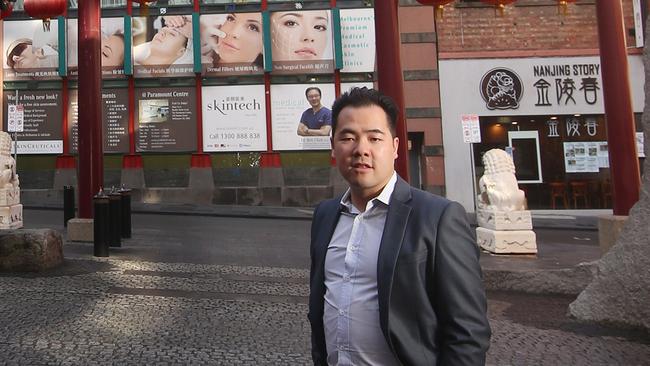China diaspora: Communist Party propaganda teaching 1.2m locals to fear internment
Chinese Australians are looking to history, fearful that they could be rounded up and jailed if China’s growing Cold War with the West gets hot.

Chinese Australians are looking to history, fearful that like the Japanese and Germans before them they could be rounded up and jailed if China’s growing Cold War with the West gets hot.
Members of the 1.2 million community of Australians with Chinese heritage are being squeezed in a cultural and propaganda war.
Fears of discrimination and mistreatment are being stoked by Chinese Communist Party propaganda which remains the main news diet for many Chinese-speaking residents abroad.
The party has told ethnic Chinese everywhere to fear a rise in racial discrimination, a message it has supercharged in the wake of the COVID-19 pandemic.
Outspoken China critic and former Parramatta councillor John Hugh says the silent majority of the Chinese diaspora in Australia is fearing internment here.
“They fear if a war broke out there could be anti-Chinese riots like in the Second World War and what happened to the Japanese migrants (to the US),” he says.
“To be honest I have certain degree of fear as well. It is definitely something that is used by the mainland (China) to scare people in Australia.”
Articles have started to appear in Chinese online media about the treatment of Japanese Americans during World War II.
More than 120,000 people of Japanese ancestry, most of whom were US citizens, were put into camps in the western interior of the US between 1942 and 1945.
In Australia, almost 7000 people, mostly Germans, were placed into internment camps during World War II because of fears of a German fifth column.
“People are speculating if the current trajectory keeps developing whether the same thing could happen,” a senior business figure says.
“People are talking about internment. I would not say it is a prevailing theme but certainly people are talking about it. People worry about whether the loyalty of the (Chinese) community here will be called into question if there is a conflict and how they will be seen.”
The Australian was told that the question of loyalty was being openly discussed in households.
Frank Ruanjie, managing director of the Tiananmen Times and spokesman for Embracing Australian Values Alliance (Melbourne), says an “enemy mentality” is instigated by CCP propaganda through Chinese language media within the Australian Chinese community.
“There must always be an imagined enemy from the West for the Chinese community to struggle against so they can be protected,” he says.
At a round table with Chinese community leaders in Sydney, some say the issue of internment provokes strong reactions.
“The problem is on face value no one can second guess where our loyalties are. We are perpetual foreigners no matter how generous we are,” prominent Sydney lawyer Kingsley Liu says.
“People are discussing internment in the Chinese community, absolutely, all the time.”
Daphne Lowe Kelley, a New Zealand-born historian of Chinese heritage, says most in the diaspora would consider themselves to be Australian of Chinese descent.
“I know there can be problems when people who are non-Chinese see someone who looks Asian and have no idea whether that person has been in the country for 100 years or only just been here 20 years,” she says.
Historically, Ms Lowe says Australia’s Chinese population has been very loyal even during the world wars when the White Australia policy was in place.
“The coronavirus is seeing our Australian-ness questioned and loyalties challenged”, says Jieh-Yung Lo, an Australian-born Chinese whose parents came to Australia via Vietnam. “People like me are collateral damage.”
Mark Wang, chief executive of the Melbourne Chinese Museum, says that during World War II, the Chinese were targeted as being Asian and like Japanese. “They even had ASIO saying that Chinese restaurants are suspicious places,” he says.
Tony Pun, who led efforts for Chinese students to be allowed to stay in Australia after the Tiananmen massacre, says the question of his loyalty is raised “all the time”.
“I stand with Australia and all its people but the reason people … ask where you stand on China is they are race baiting,” he says.

